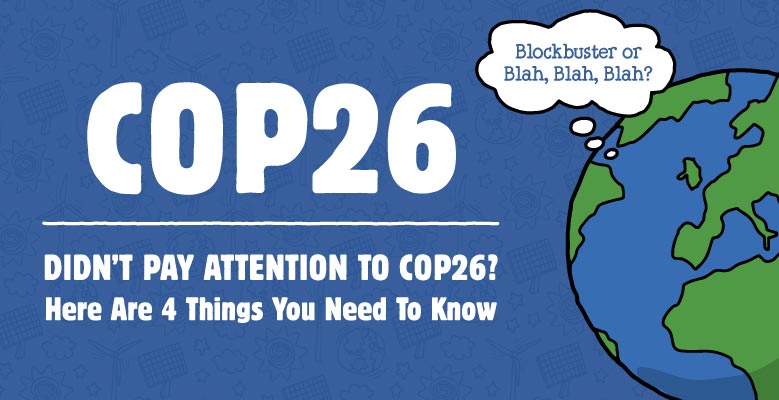November 17, 2021

World leaders gathered in Glasgow, Scotland, for the most important global meeting on climate change since the Paris Climate Summit. Two issues were at the top of the agenda: Fighting climate change by ramping up ambition and efforts to keep average global temperature rise below 1.5ºC and seeking climate justice by ensuring that the most vulnerable people and nations are compensated by wealthy nations for the loss and damage that has already occurred from climate change.
So, when the final gavel came down on COP26, what was the verdict? Blockbuster climate agreement for the world, or just more hot air?
In the fight to keep climate change below 1.5ºC, some small steps were taken. In the fight for climate justice, COP26 was much talk and little to no action. The youth climate strikers of Fridays for Future described the final outcome as “infuriating and disappointing”. Here are our four takeaways from COP26.
-
Wealthy countries, including the United States, the members of the European Union (EU), and the UK, failed to step up and take responsibility for loss and damage that is already occurring in the poorest and most vulnerable countries from climate change. The overwhelming majority of historic emissions driving the warming climate have come from the richest nations, while the poorest are paying the steepest price. Wealthy nations blocked the creation of a loss and damage fund, turning their back on the world's most vulnerable and their calls for climate justice. Climate Action Network International referred to it as “a betrayal to the millions of people suffering from the climate crisis in developing countries”.
-
On a slightly more hopeful note, the final text of the Glasgow Agreement—after decades of campaigning and 27 years of negotiations—calls on all countries to “accelerate the transition towards low-emission energy systems, including efforts to phase down coal power and ‘inefficient’ subsidies for fossil fuels”. It seems a little hard to believe, but this is the first time in history that the need to put an end to fossil fuels was formally recognized in the climate talks.
-
The fight to keep warming below 1.5ºC is on life support. The target set in the Paris Climate Agreement was to keep average temperature rise well below 2ºC and preferably 1.5ºC. Importantly, the Glasgow Agreement recognizes that “the impacts of climate change will be much lower at the temperature increase of 1.5°C compared with 2°C”. However, there is a gap between current emissions reduction pledges and the 1.5ºC goal—current pledges are actually more consistent with a 2.4ºC temperature rise. The agreement does set up an urgent process for countries to close this emissions gap by submitting more aggressive reduction commitments by COP27 in Egypt next year. This process is one of the more important outcomes of COP26, but it kicks the can down the road instead of tackling the gap now. The science is very clear: There isn’t much road left.
-
Despite all the barriers to participation in COP26—from vaccine inequity and the UK’s hostile border policy to a lack of access to the venue and negotiators—youth from around the world and people from frontline and Indigenous communities showed up in Glasgow by the tens of thousands and marched in the streets with a message for the leaders inside: Climate justice now!
Legendary rocker Patti Smith performed her song, “People Have the Power”, from the stage of the Pathway to Paris concert in Glasgow during COP26. Her lyrics continue to inspire us.
Listen
I believe everything we dream
Can come to pass through our union
We can turn the world around
We can turn the earth's revolution
We have the power
People have the power
This people power will deliver the end of the era of fossil fuels and a just transition to a fossil-free future for the world’s poorest and most vulnerable. The world’s youth are leading this movement. There’s power and hope in their words and in their actions, and because of them we’re more optimistic than ever that, working together, we can hold world leaders accountable. What happened on the streets of Glasgow, more than what happened behind closed doors, is why we will win the fight against climate change and for climate justice.

